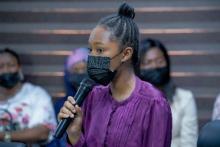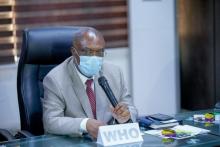Nigeria renews commitments to improve adolescent health towards achieving UHC
Abuja, 25th March, 2021 - Nigeria’s Minister of Health, Dr Osagie Ehanire says to progress on Universal Health Coverage (UHC), the country recognizes the need to keep adolescents at the center of all programmes, centered around their health and development.
To ensure ‘no adolescent or young person is left behind’ the Ministry will continue to collaborate with all partners and stakeholders to respond to the needs of different categories of adolescents and young people who are at various levels of vulnerabilities,” says the Minister of Health, Dr Osagie Ehanire at the 2022 National /International Adolescent Health Week (IAHW) commemoration in Abuja.
According to the minister, “we are therefore advocating and making all efforts to strengthen effective coordination of adolescent health program nationwide” while urging all partners to replicate the same structure in their respective states to ensure continuous delivery of essential gender-responsive services and to mitigate barriers faced by adolescents and young people in accessing services in the country.
The IAHW is a week-long participatory event commemorated globally and annually in the third week of March aimed at celebrating young people with the goal of working collectively towards improving the health and well-being of adolescents across the world. The theme for this year, 2022 is “Transitions: Building a case for the visibility of adolescents in Nigeria while transitioning from a pre-pandemic to a life shaped by pandemic.”
To flag-off the eventful week earlier, an adolescent advocate, Isabella Anani, noted that adolescents are the leaders of now and the future and should be treated as such. For her, it is an accomplishment to have a whole week dedicated to the health and wellbeing of adolescents.
She however called on the government and stakeholders to provide support to adolescents, emphasizing that “adolescent health cannot be underestimated. We need to be prepared - physically, mentally, and psychologically. There should be a cohesive effort from parents, guardians, teachers and the government to ensure that we transit successfully to the next stage which comes with great responsibility, decision making and character building for a greater nation.”
Adolescents constitute a significant proportion (22%) of the total population of Nigeria. Progress towards achievement of the Sustainable Development Goals and UHC requires improving the health and well-being of the adolescents by appropriate investment and effective coordination across all levels.
The National Demographic and Health Survey (NDHS 2018) shows that 19% of teenage girls are mothers and pregnant with their first child, 32% do not attend Antenatal care (ANC) and 66% delivered without supervision by skilled birth attendants and an HIV prevalence of 1.9 million which has high gender disparity among young people. This is compounded with the impact of Covid 19 pandemic on our already fragile health system.
Reiterating WHO’s commitment to adolescents’ wellbeing in Nigeria, the Country Representative, Dr Walter Kazadi Mulombo, stressed that the needs of adolescents in the peri-covid era are unique and diverse.
“WHO will progressively strengthen its work in adolescent health, expanding its portfolio in research, norms and standards, country support and advocacy, and scaling up the scope of work in line with the Accelerated Action on the Health of Adolescents (AA-HA) guidance to address the multifaceted needs of the global adolescent population,” WR said.
He noted that the national PHC Summit coming up later in the week is also an opportunity for galvanizing multi-sectoral action for adolescent health and wellbeing.
He urged stakeholders to redouble their commitments towards ensuring that adolescent’s health remain high on the global agenda for healthier future.
Technical Contacts:
Dr Joy Ufere; Email: uferej [at] who.int (uferej[at]who[dot]int)
Dr Ezekwe Bosede; ezekweb [at] who.int (ezekweb[at]who[dot]int)


